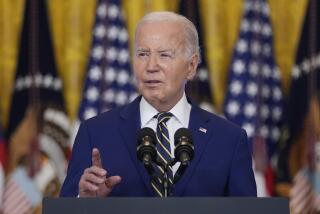In Pentagon vote, House looks to undermine âdonât ask, donât tellâ policy
The Republican-led House made a last-minute effort Friday to undermine the administrationâs policy allowing gays to serve openly in the military, sparking a heated debate over same-sex marriage as the Pentagon ordered the armed forces to begin admitting service members without regard to their sexual orientation.
As part of $650-billion defense spending bill approved by the House, Republicans, with help from some Democrats, pushed through amendments to block training funds for the new era in the U.S. military, which historically had banned gays from serving openly. The defense spending bill also would prohibit the use of federal funds to promote or recognize same-sex marriages.
The provisions were more symbolic than substantive, underscoring GOP unease with the dismantling of the law that bars openly gay people from serving in the military. Any Pentagon funding measure would have to be adopted by the Senate, which is unlikely to go along with such provisions.
Congress in December repealed the âdonât ask, donât tellâ law prohibiting gays from serving openly, but the Pentagon has been working to draft new training and procedures for the change.
The adoption of the House provisions capped a three-day process that had been largely focused on spending -- from a proposal to cap the Pentagonâs budget for military bands to a late-night debate over the National Guardâs $20 million sponsorship of racecar driver Dale Earnhardt, Jr.
Nineteen Democrats joined 229 Republicans in supporting one amendment, offered by Rep. Virginia Foxx (R-N.C.), to block the use of federal funds to recognize same-sex marriages. Gay rights advocates said the measure would have no practical effect, but saw it as an attempt to reignite a debate that reached its conclusion late last year when Congress repealed the law.
A second amendment, offered by Rep. Tim Huelskamp (R-Kan.), would block funding for training of military chaplains, which Pentagon officials have said would be a condition of the repeal.
âI fear that chaplains who refuse to perform these ceremonies may find themselves under attack and their careers threatened.â Huelskamp said. âRepealing âdonât ask, donât tellâ was supposed to be about allowing people in the military to serve openly, not about promoting same-sex marriage in contravention of the Defense of Marriage Act.â
Human Rights Campaign spokesman Michael Cole-Schwartz said the provision, if it became law, could complicate the training process that is required as a condition of the repeal of âdonât ask, donât tell.â
âThis is an attempt to play politics with this bill and to open up the already-settled issue of âdonât ask, donât tellâ repeal by throwing a spurious issue into the conversation,â Cole-Schwartz said.
More to Read
Get the L.A. Times Politics newsletter
Deeply reported insights into legislation, politics and policy from Sacramento, Washington and beyond. In your inbox three times per week.
You may occasionally receive promotional content from the Los Angeles Times.










